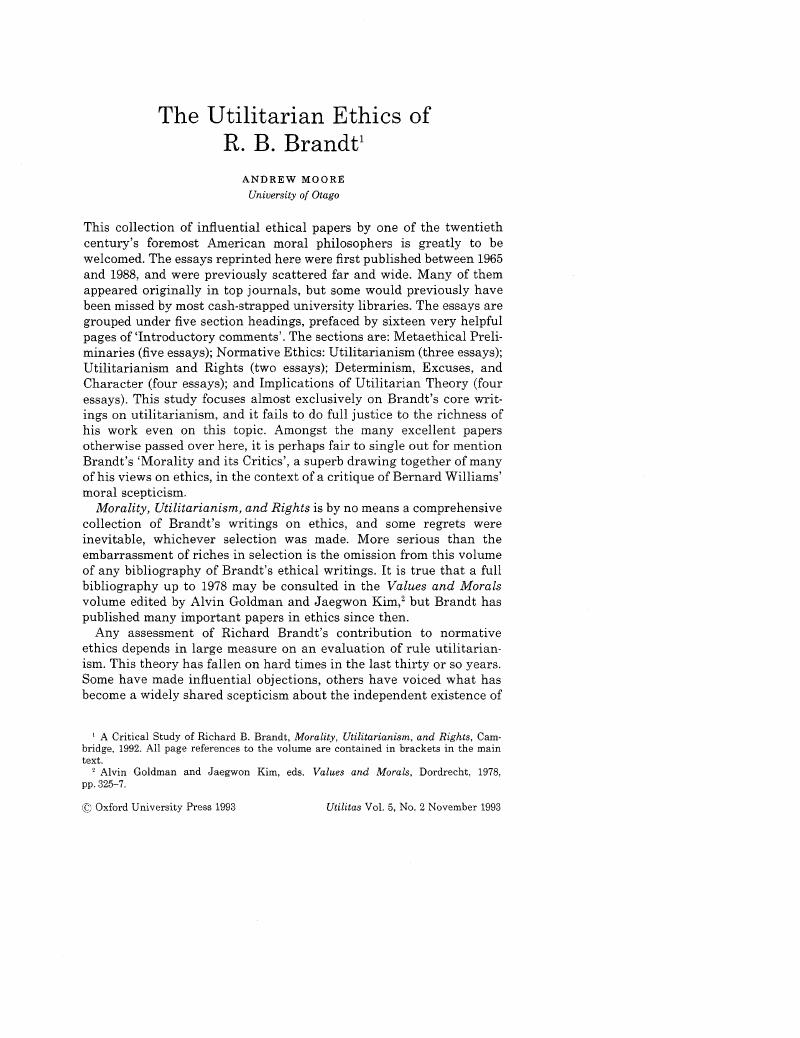Published online by Cambridge University Press: 26 January 2009

A Critical Study of Richard B. Brandt, Morality, Utilitarianism, and Rights, Cambridge, 1992. All page references to the volume are contained in brackets in the main text.
2 Goldman, Alvin and Kim, Jaegwon, eds. Values and Morals, Dordrecht, 1978, pp. 325–7.CrossRefGoogle Scholar
3 See, for example, the ‘rule worship’ objection in Smart, J. J. C.'s influential critique, variously reprinted in revised forms, ‘Extreme and Restricted Utilitarianism’, Philosophical Quarterly, vi (1956), 344–54CrossRefGoogle Scholar. For the influential claim that rule utilitarianism collapses into extensional equivalence with act utilitarianism, see Lyons, David Forms and Limits of Utilitarianism, Oxford, 1965.CrossRefGoogle Scholar
4 In Bowie, N. E., ed., Ethical Theory in the Last Quarter of the Twentieth Century, Indianapolis, 1983.Google Scholar
5 On the other hand, some anti-utilitarians will be disappointed that Brandt sets aside objections, such as those from justice, which have been urged against all forms of utilitarianism (136).
6 In his later paper, Brandt calls his view an ‘indirect optimific theory’, on the grounds that he assesses actions not directly, in terms of their own consequences for welfare, but indirectly, in terms of the consequences for welfare of rules which permit or require them. Many other writers use ‘indirect’ to refer instead to those theories with utilitarian criteria of right action which allow moral thought and motivation to be non-utilitarian. I much prefer Brandt's usage, but I shall side-step possible confusion here by using only Brandt's earlier term, ‘ideal rule utilitarianism’.
7 Brandt claims that act utilitarianism imposes unbearable demands (9), and that it cannot give a proper account of the personal nature of morality (131). These matters have now been very widely discussed. Only very recently, however, have scholars seriously investigated Brandt's suggestion that rule utilitarianism can do much better on these matters. See Hooker, Brad ‘Rule Consequentialism’, Mind, xcix (1990), 67–77CrossRefGoogle Scholar, and ‘Brink, Kagan, Utilitarianism and Self-Sacrifice’, Utilitas, iii (1991), 263–73.CrossRefGoogle Scholar
8 Brandt, 's ‘A utilitarian theory of excuses’Google Scholar and ‘A motivational theory of excuses in the criminal law’, both reprinted here, set out and defend his detailed views on the subject.
9 Brandt is very clear in these essays that code maintenance is to be taken into account. Given his discussion of moral training (126), and of the task of moral teachers starting from our current situation (147), he seems also to include establishment costs and benefits.
10 This paragraph includes several instances of the standard ideal rule utilitarian reply to objections: formulate a suitably objection-silencing rule, and hypothesize that it would be in the ideal code. Complex counterfactual hypotheses of this sort are as hard to refute as they are to confirm. Still, objection-silencing rules typically need to be complex, and this is enough to make their membership of any meant-for-everyone code rather improbable.
11 Thus Hooker, Brad, for example, in ‘Rule Consequentialism’, Mind, xcix (1990), 67CrossRefGoogle Scholar: ‘an act is morally right if and only if it is called for [or allowed] by the set of desires and dispositions the having of which by everyone would result in at least as good consequences judged impartially as any other’.
12 Rawls, John, A Theory of Justice, Oxford, 1972, p. 30.Google Scholar
13 Brandt uses ‘utility’ and ‘welfare’ interchangeably, and I shall stick with the latter concept. On the multiple ambiguity of ‘utility’, see Broome, John, ‘Utility’, Economics and Philosophy, vii (1991), 1–12CrossRefGoogle Scholar. To avoid confusion, I shall also prefer ‘desire fulfilment’ to Brandt's ‘desire satisfaction’. Brandt is crystal clear that he means only the obtaining of that which is desired, but very widespread recent usage understands ‘desire satisfaction’ also to include the pleasure or enjoyment arising from this.
14 Griffin, James, Well-Being, Oxford, 1986Google Scholar, chs. 1 and 2. On the question whether ‘desire fulfilment’ retains a working role, see pp. 17, 26–7.Google Scholar
15 Brandt, 's ‘Rational Desires’Google Scholar is reprinted in the volume under review. See also A Theory of the Good and the Right, Oxford, 1979Google Scholar, and ‘The Concept of Rational Action’, Social Theory and Practice, ix (1983), 143–64.CrossRefGoogle Scholar
16 Brandt acknowledges and briefly discusses this problem (174–5). For more on his happiness theory, see A Theory of the Good and the Right, especially ch. 13, and ‘Fairness to Happiness’, Social Theory and Practice, xv (1989), 33–58.CrossRefGoogle Scholar